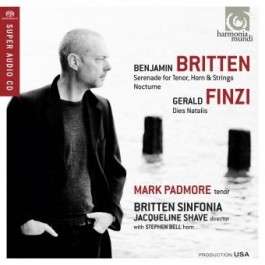|
Back
05/17/2012
Benjamin Britten: Serenade for tenor, horn & strings, Op. 31 – Nocturne for tenor, seven obbligato instruments & strings, Op. 60
Gerald Finzi: Dies Natalis, Op. 8
Mark Padmore (tenor), Stephen Bell (horn), Britten Sinfonia, Jacqueline Shave (director)
Recorded at Air Studios, Lyndhurst Hall, London, England (February 2011) – 79’
harmonia mundi HMU 807552 – Booklet with essays, tests and translations in English, French and German

   
Mark Padmore has been known to lieder aficionados for quite some time. The British tenor has several renowned discs to his credit and maintains a full recital schedule in Europe. Notably, he was a penetrating Evangelist in the Berliner Philharmoniker's recent staging of Bach's St. Matthew Passion. On this harmonia mundi release, Padmore's talents are put through a rigorous workout. He is clearly a veteran of lieder in his renditions of these dense and challenging poems. In addition to having ample vocal resources to dispatch the treacherous phrases of Britten, Padmore displays incomparable interpretive insight. As if that weren’t enough of an argument for this disc, the playing by the Britten Sinfonia is staggeringly beautiful and the team at harmonia mundi outdo themselves in presenting a thoughtful and impacting recorded sound.
The juxtaposition of two of Britten’s most famous song cycles seems to be a safe choice as far as programming is concerned. Virtually every prominent recording of the famous Serenade also features the Nocturne. Indeed, the two pieces have much in common. Aside from featuring a solo tenor, both works also feature horn and string orchestra. Britten’s selection of poems for each work is also quite similar. These are cerebral works from the likes of Blake, Tennyson, Coleridge, and Shakespeare, compelling enough to require not just a singer, but a singer of considerable communicative skills. Benjamin Britten’s longtime partner Peter Pears premiered both of these works and it would be untoward to disparage his considerable contributions to them, but there is a certain liberation of sound that Padmore possesses that his predecessor occasionally did not. Padmore’s technique allows him to navigate through his registers with ease and subsequently give unambiguous readings of the texts. It is not sufficient to say that Padmore’s diction is outstanding, his mastery of the texts is unobtrusive and wholly natural. I keep returning to “Dirge” from the Serenade as a summation of the entire cycle. The 15th Century Olde English text is piercingly clear. Of course, the finest diction in the world would be worthless without a great voice behind it. Padmore’s highest strains are shattering and his mixed voice is smooth yet alluring. His virtuosity in the subsequent “Hymn” is impressive. Padmore dispatches the melismas with precision and his piano tones are still as discernible as his loudest. Horn player Stephen Bell plays with dashing assuredness and is a fine collaborator. His work on “Nocturne” from the Serenade is especially pleasing as he plays off Padmore with infectious character.
As outstanding as the Serenade is, I think the Nocturne finds all involved at their finest. The heretofore barely mentioned Britten Sinfonia play with astounding cohesiveness, as they do on the rest of the program. Their precision, in both rhythm and tone, combined with Padmore and the various soloists, give the Nocturne an eerie starkness befitting the poetry. Padmore’s delivery of Britten’s less melodic lines is downright chilling. One can sense a character truly tortured by dreams and sleep, or perhaps, lack of both. His singing in “Midnight’s bell goes ting, ting, ting,” is a fine example. His earnest delivery of Middleton’s humorous poem suggests someone who is not all there. One can sense that this is a completely different “character” than the one who inhabited the earlier, more rapturous Serenade.
More different still is the one who inhabits Gerald Finzi’s wide-eyed Dies Natalis. Supplied with Finzi’s long, lyrical lines, Padmore sings with charming innocence. It is a striking departure from the former pieces and a welcome respite in a way, yet, as wonderful as this performance is, the impact of the earlier Britten performances is what stays with the listener. harmonia mundi’s team created a beautiful SACD surround layout with Padmore in the clear center, with strings on either side. The solo instruments are on either side and elevated, and the balances are always perfect. This is a fine demonstration disc for what SACD can do for chamber music. The delicacy of the undulating strings in the Nocturne is captured in unreal detail.
All considered, this is a disc that summons repeated listenings. Given the strengths of all performers involved and superb sound, it would not be out of the question, with all do respect to Mr. Pears, for this to be the new reference recording for these masterpieces from Benjamin Britten.
Matthew Richard Martinez
|